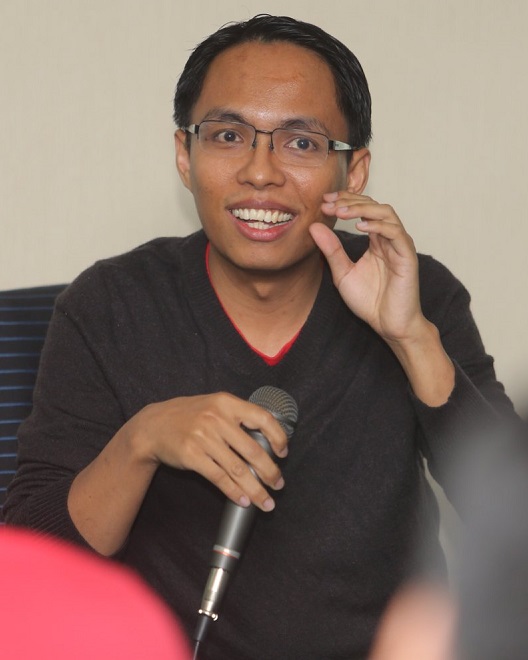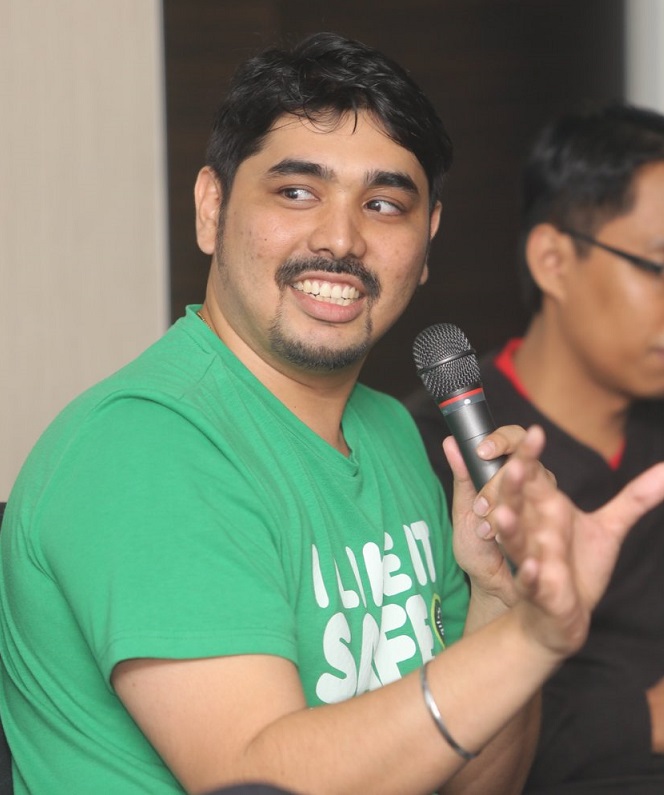Disrupt: When startups get cheated, and dealing with ‘money men’: Page 2 of 2
By A. Asohan April 25, 2014
 Talent: Diamonds in the rough
Talent: Diamonds in the rough
Another issue startups have to deal with is getting the right talent on board, especially when business starts scaling and you need to hire.
Slashes & Dots' Azrul (pic) had a few thoughts on that. “When I was invited to be a panellist on leadership, my first thought was, ‘What? You guys want to learn about leadership from me?’
“That was a bit of a shock, but then I realised that I had a lot to offer in terms of what you should NOT do. (The things he screwed up in and the things everyone else should avoid). Some of the things we did wrong, and some of the things we should have done differently.
It is true, all the problems in a startup is ultimately our responsibility. It’s a matter of whether we have the courage to fix it, whether we accept that it is something we have to work on.
“The most valuable lesson I can share is about hiring – how to get the right person, and what to do if you get the wrong person. That has been a passion of mine.
“When people ask me about the biggest challenges I faced as an entrepreneur, it’s always about people – people in the form of yourself, or those whom you initially hire.
“When we had grown to about 40 people, some of the worst hires we had were these so-called superstars because they demand too much. They feel entitled and believe they should be treated in a special way,” he added.
As a software development company, Slashes & Dots needed technical people. As a startup, it could hardly afford to hire the best.
“It’s tricky trying to hire top talent. In my case, what we do is go out and hunt for those not considered superstars because they are very expensive. We hire a lot of new guys who are just starting out – one of our best hires does not even have a degree,” he said.
“We have hired and gone through a lot of people. Good people aren’t always expensive. There are good, young people who are willing to start, willing to learn – they are out there. You just need to find them,” he said, adding that they could be a startup’s diamonds in the rough.
The people issue was one that MaGIC’s Cheryl had to struggle with too, especially after they shut down the first company and pivoted into the second. With the new business model, they had to cut down their people from nine to five.
“I had to fire some people. I had to fire some good people. I had to even fire my room-mate, who was our first engineer,” she said.
For MyTeksi’s Aaron, the talent equation was really about hiring “people who are smarter than us, or who are better than us.
“That is the key, to just realise that you don’t really know everything, and you need help … in almost everything,” he said.
The equity lure
But it’s not easy for startups to hire the best when they cannot afford the requisite salaries. If you hire people smarter than you, do you have to pay them higher salaries than you, asked one participant.
“Definitely! You have to pay top-dollar for top talent,” said Aaron. “Of course, in the beginning, you can’t – so that’s when you share equity.
“Don’t be afraid to give out equity – don’t try and own everything, because then you might end up with nothing,” he said.
When asked if people in Malaysia value equity, Aaron admitted that they usually don’t. “But I think it’s starting to change.”
Now, however, MyTeksi would prefer not to give out equity, since it can afford to pay those kinds of salaries.
“Equity is very expensive to give out, so it matters how you give it out. We give it out with a four-year vesting period, with a one-year cliff.
“So if for some reason we don’t get along in the first year, you get nothing. You have to prove your worth in that one year. If you want all your equity to vest, you have to stay on for four years – if you leave after two years, you only get half,” he said.
He said that one was one of the best pieces of advice MyTeksi ever got, from the people it spoke to in its early stage.
“It’s the ‘test and invest’ model. You invest in the person, and test him at the same time. That is how we found out who our superstars were,” he added.
Azrul said that in his personal experience in trying to attract developers, the technical community in Malaysia does not care so much for equity.
“In my personal experience, Malaysian technical guys do not care so much about equity. What they really care about is being part of building something cool.
“What I personally do is make sure we pay them well. We share revenue as much as possible, but generally you don’t have to offer technical guys equity if you can offer them a challenge to build something cool,” he said.
As a technical person himself, Aaron in fact could relate to that. When asked what attracted him to MyTeksi, he spoke about how he had just closed down one of his ventures which did work for government-linked companies or GLCs.
The GLCs paid top dollar, but he had found the work unfulfilling, so he pitched for a project to revamp the website of movie distributor and cinema chain TGV because he personally found its online ticketing system frustrating.
He won the project and redesigned the site. “The scale was amazing, in terms of the number of transactions that was happening, and I realised that what I wanted to do was something that would have a real impact on people.
“Basically, I am an engineer. I want to build things. I want to make things better, I want to make things faster, I want to make things cheaper,” Aaron said. “I want to do things.”
Then he met Anthony Tan, the young founder of MyTeksi and the grandson of the founder of Tan Chong Motors, one of the largest conglomerates in Malaysia.
“When I met him, he told me: ‘I want to do things too. I want to change the taxi system in Malaysia.’ And I said, ‘yeah!’
“He said he couldn’t do it on his own. Unbeknownst to all, he actually tried it a year earlier, and it had failed.
“I usually don’t like rich kids, but he was different and he genuinely wanted to change things. So we decided to try it out for a few months, I built it, and then he invited me to join him. ‘Let’s do it together, let’s go all the way.’
“And I said, ‘Okay, let’s do it!’ So I took my entire team into MyTeksi,” he added.
Regrets, they’ve had a few

When asked by moderator Karamjit what their biggest regrets were, or if there was anything they would do differently, all three entrepreneurs had a different take.
For MyTeksi’s Aaron (pic), it was pretty much about the business. “We regret not moving faster. We really only scaled and grew when there was competition.
“We were technically first movers in this industry in this region. We publicly launched in June 2012 … and by June 2013, we only had 1,200 drivers in our system.
“The competition came – big competition with big money, which I’m sure you all know,” he said, referring to but not naming Rocket Internet’s EasyTaxi, with its US$15 million.
At the time, MyTeksi was just waited for taxi drivers to walk into its office. “So we switched. Within three weeks, we had hired 10 salespeople, and we all went down to the ground and started selling to individual drivers – all of us.
“We recruited 1,000 drivers per month. It’s all about execution, money is not enough,” Aaron said.
For Azrul, not surprisingly, it was about people.
“There are lot of thing I would do differently. One of the biggest mistakes is that I got into the Internet way of doing things too much – I was so engulfed by it that I perhaps sometimes did not connect enough with people,” he said.
There is another ‘people equation’ for him – he founded his company with his wife, and husband-wife teams can be their own challenge.
“There are only two ways – either it works, or it doesn’t,” said Azrul.
“You read all this stuff on the Internet about having set boundaries and not mixing work with your personal lives, but that’s not going to happen. You are going to mix it up.
“So find someone you can mix it up with. There’s no easy way around it,” he said.
Finally, when it comes to regrets, MaGIC’s Yeoh said: “I could write a book about it. But to pull one out, it was after the first venture failed, I was so focused on getting my investors their money back. I feel I should have just shut that company down, walked away, focus on the next venture and start afresh.
“But I couldn’t. My first investor said that if you fail your first venture, I will double down on your next venture. It’s kinda like they invest in you, the entrepreneur, and not the product or market, most of the time.
“My investors were quite forgiving, but because we had pivoted and got more users, there was a lot of baggage from that failed first venture,” she said. “I wish I had realised then that it’s okay to fail.”
Perhaps the one thing that Aaron doesn’t regret is deciding to take that journey with his founder and group CEO Anthony Tan. Indeed, he takes it quite personally when people ask if having the grandson of a famous tycoon helped MyTeksi ‘open doors.’
“The only advantage that we got was that we could pay salaries on time,” he said, but then collected himself and added, “Actually, there was another advantage.”
In the early days, when MyTeksi was going around trying to get taxi companies interested in the idea, they were all sceptical and uninterested. It was very discouraging, he said.
The last company they spoke to was Comfort Radio Taxi, and in a meeting with its chairman Aslah Abdullah, Tan gave him his card. At the time, he wasn’t fully into MyTeksi yet and was still attached to Tan Chong Motors.
When the chairman looked at the card, he asked Tan if he was related to the founder of Tan Chong Motors, and the latter admitted he was the grandson.
Aslah “ran up to his room, and came down with a model of a Datsun 120Y,” said Aaron.
“He told Anthony [Tan], ‘Your grandfather helped me when nobody else would help me. He gave me my first 40 cars to start Comfort Radio. I can’t pay him back now since he’s passed away, but I can give you 40 cars.’
“And that’s how MyTeksi started. That was our first 40 cars. What goes around, comes around,” said Aaron.
Previous Instalment: Disrupt: Heartfelt lessons, honesty and founder war stories
For more technology news and the latest updates, follow us on Twitter, LinkedIn or Like us on Facebook.


